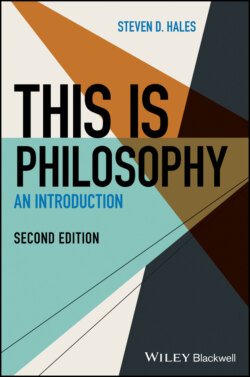Читать книгу This Is Philosophy - Steven D. Hales - Страница 8
ОглавлениеPREFACE FOR STUDENTS
If this is the first philosophy book you’ve ever read, then you probably have no idea what you are in for. You pick up a book on chemistry and you expect diagrams of molecules and talk about “valences” , a book on German and there will be long multi-syllable words and lots of umlauts. But philosophy? What could that be about?
The word “philosophy” comes from two Greek words: “philia” which was one of the Greek words for love, and “sophia” which means wisdom. Thus philosophy is the love of wisdom. You may think that is not terribly informative, and it isn’t. However, you have to remember that back in ancient Greece, to be a scholar at all meant that one is a philosopher. You might have been a stonemason, a fisherman, a soldier, a physician, or a philosopher, a pursuit that would have included mathematics and science. Over the years, as concrete, definite advances have been made in different areas, philosophy has spawned spin-offs, fields that have become their own disciplines with their own specific methodology and subject matter. Mathematics was one of the first fields to splinter off this way, and then in the Renaissance science became separate from philosophy. In the 19th century psychology broke away from philosophy, followed by economics. Most recently cognitive science, which used to be the scientific end of philosophy of mind, has become its own field. In some ways philosophy proper is left with the hardest questions, the ones that we have made the least definitive progress on.
That does not mean that philosophers have made no progress in 2500 years. We have. Nevertheless, the philosophical issues to be discussed in the present book are tough nuts to crack. Let us hope you do not crack your own coconut in the attempt! In the modern era, philosophy is (very roughly) in the business of giving good reasons for one’s non-empirical beliefs. That is, philosophers try to give arguments for believing claims about the nature of the self, or the existence of God, or moral duty, or the value of knowledge. These are topics that the scientific method of performing laboratory experiments and giving mathematical explanations does poorly in addressing. Philosophers take seriously the findings of experts in other disciplines, but we still have our own puzzles to solve.
Some philosophical topics stir great passions, and people find it threatening to ask questions about those issues. Philosophers are proud that one of the greatest philosophers in ancient times, Socrates, was executed by the state1 because he refused to stop questioning authority. Socrates claimed to know little, but he was willing to go down for the pursuit of truth, fearless inquiry, and the life of the mind. If you are to find something of value in this book, you too need to be prepared to question your longstanding beliefs, to honestly ask yourself if the things you may have believed your entire life are actually true. All of us believe some things for poor reasons, and to be a philosopher is to try to ferret out those beliefs and either justify them or discard them as unworthy of your intellect. It is a difficult and often painful process to become an athlete of the mind, but there is great joy and thrilling discoveries to be had as well.
Just beneath the surface of your everyday life are chasms of mystery. We will not descend into the furthest reaches of the labyrinth in the present book, but there are wonders aplenty in the beginning passages. Plato wrote that philosophy begins in wonder2–so let us begin!
Website Links
1 1 http://classics.mit.edu/Plato/apology.html
2 2 http://classics.mit.edu/Plato/theatu.html
